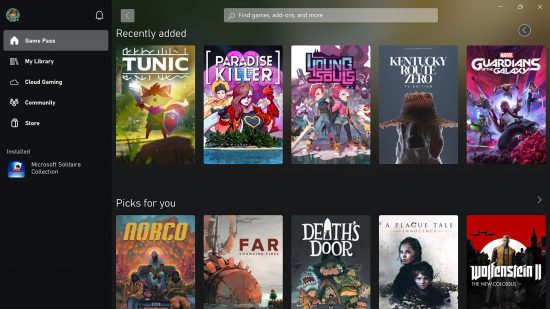The console battle between Microsoft and Sony has had a knock-on effect on PC gaming for years. Remember Games for Windows Live? That service existed purely due to Microsoft’s attempt to Xbox-ify the PC, unifying all its gaming services under one, terrible banner.
Games for Windows Live was a miserable failure, but Game Pass, Microsoft’s new subscription service, is not. The platform lets players access a wide range of PC and Xbox games for a set monthly fee (roughly equivalent to an Amazon Prime subscription) and has proved hugely popular, with Xbox head Phil Spencer announcing it had 25 million subscribers as of January this year.
This success has all kinds of ramifications for PC gaming. Some are positive, such as players accessing a large number of games for a relatively small fee. Others are more concerning, such as players getting distanced from ownership of their own media. But what intrigues me most about the potential shift from digital purchases to subscription services is how they might affect the games we play.
Currently, the most popular games are either massive, open-world single-player experiences, or online, microtransaction-based games such as Apex Legends and Call of Duty: Warzone. There are many reasons why these games are popular, but one is that they offer good value for money.
A game such as Elden Ring or Assassin’s Creed Valhalla offers dozens of hours of play for the £50 you spend on them, while Warzone and Apex potentially offer hundreds of hours of play for little investment.
But developing such games makes considerably less sense for a subscription service, where the key draw isn’t the size or the price of individual games, but the breadth of the library itself.
When you subscribe to Netflix, you want a choice of plenty of good-quality films and TV series. The length of an individual series doesn’t really matter, because you’ve always got another one lined up to watch.
It follows that the same would be true for a gaming subscription service. You’ll want to explore as much of that large library of games as possible, and if a game doesn’t grab you quickly and give you a consistently enjoyable experience, there’s no sunk cost holding your attention to ransom.
Assuming Game Pass continues to be successful, I reckon the types of games available on it will change over time. Developers working for Microsoft will shift from making 80-hour games that take many years to develop, to creating a larger quantity of shorter experiences that add greater face value to the library.
Whether or not this is good or bad largely depends on how much you like massive open-world games (and I don’t think those experiences will vanish entirely). I’m up for seeing developers given the chance to experiment with smaller projects that release quicker, and being able to sample a wider range of experience, rather than losing an entire month’s worth of evenings to a single game.
